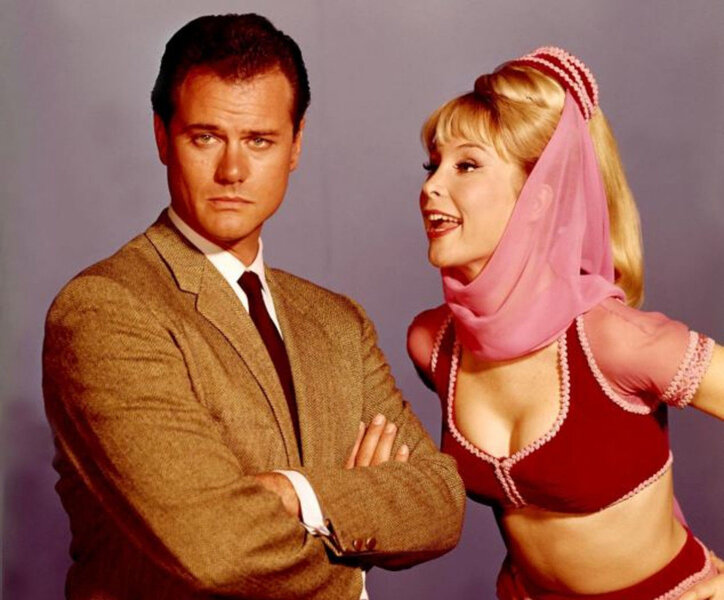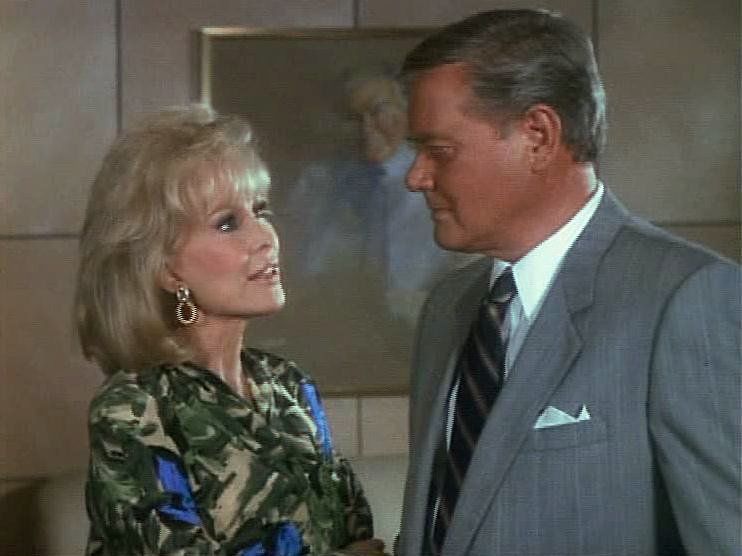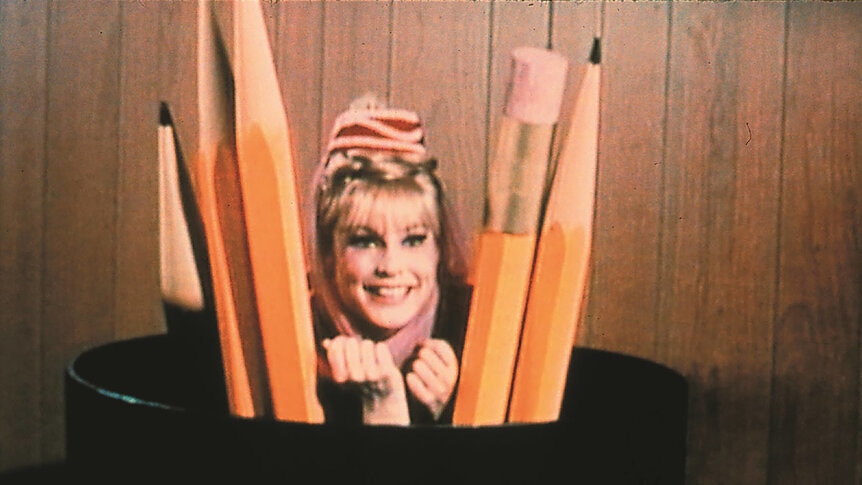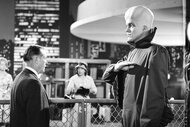Create a free profile to get unlimited access to exclusive videos, sweepstakes, and more!
Looking back on I Dream of Jeannie
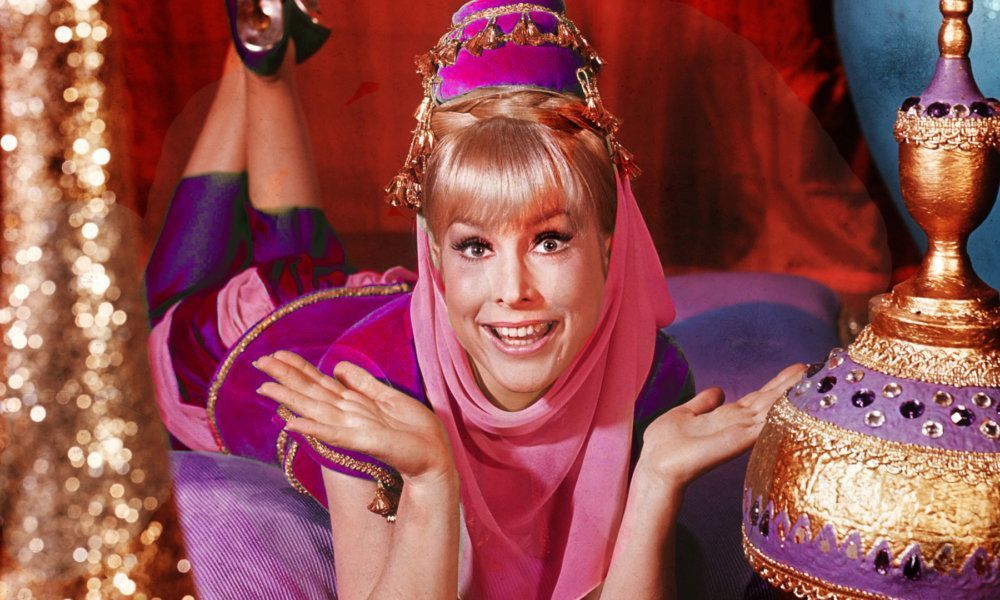
In 1965, I Dream of Jeannie debuted alongside shows like Wild Wild West and Get Smart. Featuring Barbara Eden as Jeannie and Larry Hagman as Major Tony Nelson, the series was a hit and ran for five seasons. Like coinciding shows Bewitched and I Love Lucy, Jeannie is part of an era that is in retrospect considered a turning point in television of the United States, in which women were suddenly the main characters and their conflict was more likely to motivate a story.
Because of these series, a lot of kids grew up watching plots in which women were centralized, and that was a pretty huge improvement over a lot of what was going on in media at the time.
The Set-Up
Major Tony Nelson is an astronaut whose voyage goes awry, causing him to crash land on an island in the South Pacific. There, he discovers a Jeannie in a bottle who falls in love with him immediately. She follows him home, essentially inviting herself to move in with him, and all kinds of hijinks ensue, with various celebrity guest spots throughout.
It probably goes without saying, but Barbara Eden is the absolute standout of the series. Though the men that are positioned around her are the cause of much of her conflict, her inability to take their masculine plight seriously is a major theme of the show. Due to her trusting nature and her willingness to help paired with an absolute lack of understanding of ‘60s cultural norms, Jeannie became a subversive character in ways that may not have always been central to the script but that, regardless, tested the boundaries of heteronormativity.
Jeannie causing chaos by attempting to “help” was basically the status quo for much of the show for several seasons, until Jeannie and Tony ultimately got married. Eden has said that she believed the wedding between Jeannie and Tony stretched credibility to a breaking point and ruined the endearing tension of the show, and the show did indeed end shortly thereafter. She and Hagman did appear together for an arc on Dallas, though, and if there is one universal truth it is that celebrity guest appearances on Dallas were always amazing.
Jeannie Through Today’s Lens
Whether or not Jeannie is a sexist premise has been the subject of much conversation, not just from feminists and critics, but from various celebrities as well. Eden herself was at least vaguely irritated by the implication of Jeannie as a representative of regressive sexism when she appeared in an interview with Oprah, saying that Jeannie was absolutely an empowered character and that much of her submissiveness was due specifically to her status as a genie. Geena Davis, whose work for feminist causes is significant, has cited I Dream of Jeannie as an influence on her because it demonstrated an example of a woman who was confident and in control.
Yet the show is certainly guilty of exoticism, so not all criticisms are misplaced. Jeannie is as much a product of its time as Green Acres or Hogan’s Heroes were, and there are certain choices that modern viewers will find baffling. Despite the active civil rights protests of the time, mainstream culture has yet to catch up to feminist thought to this day, let alone in the first years of the Women’s Liberation movement. An early episode, "The Americanization of Jeannie," ultimately dismisses Jeannie’s interest in feminism as foolish. Her desire to become a feminist is chalked up as being a passing interest in a fad rather than a necessary part of her evolution. Though disappointing, this is not particularly surprising considering the fact that there was an almost universally condescending reaction to feminism from even the most progressive men of the time, let alone television scriptwriters.
Still, given the potentially problematic premise of the show, there are a surprising amount of hidden gems. In "My Turned On Master," Tony is secretly given Jeannie’s powers for a limited time and doesn’t even realize that he has them. He criticizes her for not utilizing her awesome might to do all the important things that he would, to which Jeannie replies that he has had her powers for the better part of a day and has absolutely squandered them. Tony can’t get a handle on the situation and fails at every turn to use Jeannie’s powers for good, which annoys him to no end. At one point, he dismisses her so that he might carry on with what he refers to as “man’s work,” to which Jeannie quips, “It was women’s work when I was the one doing it.” Though there is a lot of sexism in Tony’s dialogue throughout the episode, you won’t walk away thinking that he’s the hero of the story. Jeannie puts him in his place regularly and with ease.
There is one thing that is undeniable, and that is that Barbara Eden as Jeannie is iconic and her work in the series is truly something to behold. While her character has been often reduced to nothing more than a blonde in a sexy outfit by many critics, it’s a pretty unfair assessment of someone who carried an entire TV show with her comedic skills for five seasons. When guest stars who were lifelong entertainers like Emmaline Henry and Sammy Davis JR himself made appearances, Eden’s effortless and good-natured humor came into the spotlight, and she matched them at every turn.
Jeannie was one of the very few characters in the media of the time who questioned her position in man’s world. To her, presumed servitude to men was an amusing game she played. While she did default to Tony’s view of how the world worked, to her that was simply a result of her existence as an outsider. She chooses to stay with Tony not out of responsibility, but because she loves him. Though she performs typically “womanly” tasks and keeps up on housework, she accomplishes these things through magic, showing audiences a memorable image of a woman making a mockery of housework and feminine duties.
Why Jeannie Prevails
The character of Jeannie remains fascinating to this day. Though the series revolves around a woman who does everything for a man who she quite literally refers to as “master," she chooses her role, and her autonomy throughout the series is unquestionable. Examining heteronormative relationships through the lens of an outsider in the time was a hugely influential action, and many people still remember the show’s influence on them well into the modern era.
I Dream of Jeannie has been criticized regularly for its basic element — a powerful woman subservient to a mostly incompetent man — but it’s important to remember that was the status quo of the time, with very few exceptions. By making Jeannie’s mischief the driving force behind the show, and making it clear that Tony was essentially incompetent and positing him as the straight man of the comedy duo, Jeannie was still subversive. Additionally, showing a relationship between an unmarried man and woman who were also living together was unheard of in its day, and Jeannie deserves some credit for that.
Ultimately, I Dream of Jeannie occurred in a very strange cultural moment, and it was one of the shows that helped define an era that, looking back, was socially conflicting. The wholesome American image of the 1950s was faltering as a direct result of its inability to reflect the troubling realities of many people’s lives. As with much television of the time, sometimes that ages surprisingly well and sometimes it doesn’t. Still, the positive impact that the series had n a lot of people’s lives is notable. By questioning and even mocking the assumed authority of men while portraying atypical relationships and subverting the stifling masculine and feminine binary ideals of the time, Jeannie helped a lot of people do the same.
The views and opinions expressed in this article are the author's, and do not necessarily reflect those of SYFY WIRE, SYFY, or NBC Universal.
